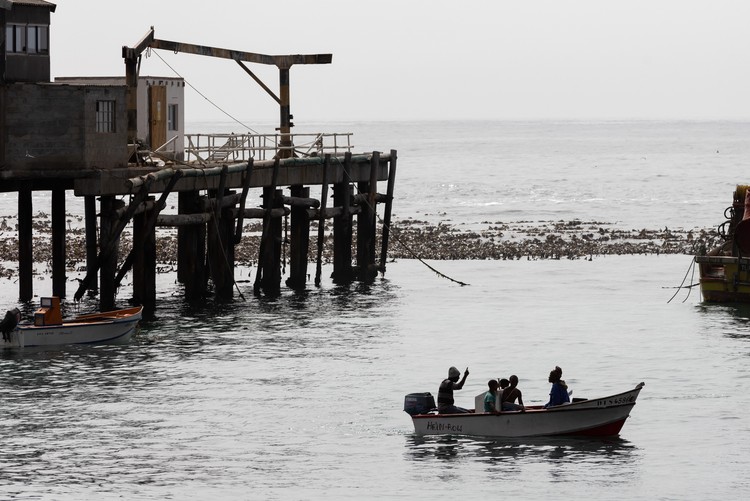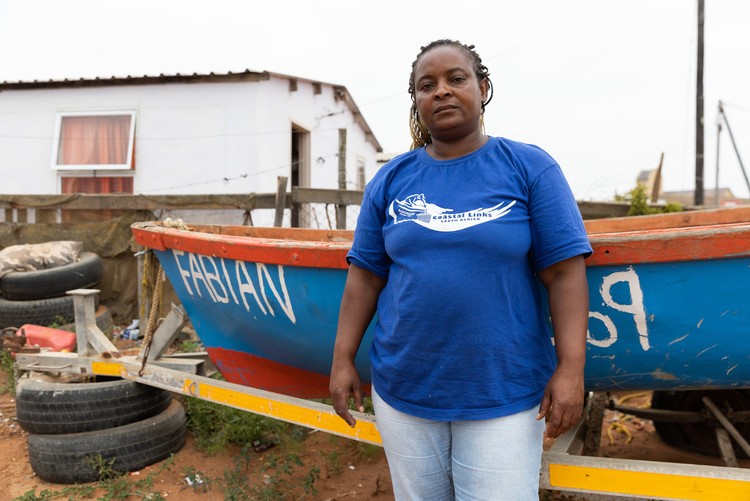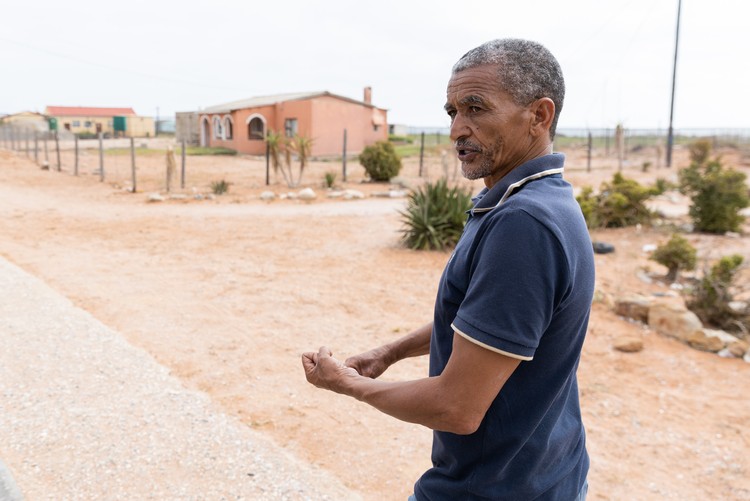“If they are coming to drill oil, who can guarantee there will be fish left in 15 years time?”
West Coast fishers respond to TotalEnergies’ plans to drill for oil and gas
Families in the small town of Doringbaai have made their living from the ocean for generations. Now some fishers are worried that oil and gas exploration plans along the west coast by TotalEnergies could disrupt their livelihoods. Photos: Ashraf Hendricks
- French energy giant TotalEnergies wants to drill up to ten exploration wells for oil and gas in the deepwater Orange Basin along the west coast.
- Some fisher families in Doringbaai say they are worried that these activities could destroy their livelihoods.
Environmental consultants for TotalEnergies say small-scale fishing activities operate “well outside” the area of interest for drilling.
TotalEnergies, the French energy giant, intends to drill up to ten exploration wells for oil and gas in the deepwater Orange Basin along the west coast, as well as conduct sonar surveys and vertical seismic profiling, among other operations. The explorations will span from 188 kilometres offshore to 340 kilometres from the coast.
Several public consultations were held in November from Hout Bay to Port Nolloth.
Fishers we spoke to in the small coastal town of Doringbaai say they are concerned about the impact the oil and gas explorations may have on their livelihoods.
Doringbaai was home to about 1,260 people at the time of the 2011 census, but residents say this number has possibly doubled since then. The town relies mostly on fishing and the Doring Bay abalone farm at the harbour.
“Oil and gas, and fishing cannot co-exist,” says Fabian Mohammed, a fisher woman in Doringbaai. “Either you go into the ocean to catch fish or [you go] for oil and gas. But you can’t do both.”
“Fishing has been our livelihood for generations … We were born here and we work here,” she says. “If they are coming to drill oil, who can guarantee there will be fish left in 15 years time? What kind of future do our kids have in Doringbaai?”
For generations Fabian Mohammed’s family have lived in Doringbaai on the west coast, and like many in the town she relies on fishing to support the family.
Government’s Operation Phakisa Ocean Master Plan to unlock the “untapped” wealth of South Africa’s vast ocean resources will make things easier for larger fishing companies to dominate over small communities, says community leader Peter Owies.
“Ocean grabbing isn’t new to us,” says Owies. “We’ll be competing as a small-scale industry where these [companies] want to operate.”
He fears the small fishers will be “driven out”.
The environmental consultants conducting environmental impact assessments (EIA) for TotalEnergies, SRL Consulting, say that natural gas exploration will “complement renewable energy” while also creating jobs and economic growth.
In the draft scoping report, the consultants note that job opportunities created will be limited and limited to skilled and semi-skilled jobs.
Mohammed says that most of the Doringbaai locals do not have the skills and qualifications needed for these projects. “How are you suddenly going to make someone who has just been a fisher for 20 years an engineer on an oil rig?” she asks.
The EIA assessment on the impact on fisheries states that small-scale fishing activities operate “well outside of the area interested in drilling” and are therefore unlikely to be affected.
Community leader Peter Owies says small coastal town communities, like Doringbaai, have been in talks about the looming “ocean-grabbing” for about a decade.
GroundUp recently reported that TotalEnergies also wants to drill between Cape Town and Cape Agulhas and has submitted its EIA for approval.
Last month, TotalEnergies told GroundUp that the use of gas instead of coal would halve carbon emissions and “drastically reduce air pollution”.
TotalEnergies was sent questions over a week ago about the concerns raised by the Doringbaai fishers, but the company had not yet responded at the time of publication.
A recent report by environmental research group Urgewald found that many multinational oil and gas companies are rapidly expanding their explorations in Africa, with hydrocarbon explorations currently in about 45 countries on the continent.
Support independent journalism
Donate using Payfast

Don't miss out on the latest news
We respect your privacy, and promise we won't spam you.
Next: How close is Cape Town to taking over commuter rail?
Previous: R27-million from Lottery but six years later rehab still not operational
© 2022 GroundUp. This article is licensed under a Creative Commons Attribution-NoDerivatives 4.0 International License.
You may republish this article, so long as you credit the authors and GroundUp, and do not change the text. Please include a link back to the original article.
We put an invisible pixel in the article so that we can count traffic to republishers. All analytics tools are solely on our servers. We do not give our logs to any third party. Logs are deleted after two weeks. We do not use any IP address identifying information except to count regional traffic. We are solely interested in counting hits, not tracking users. If you republish, please do not delete the invisible pixel.



